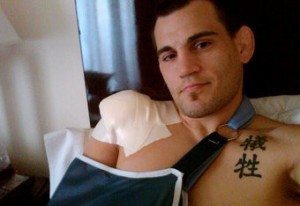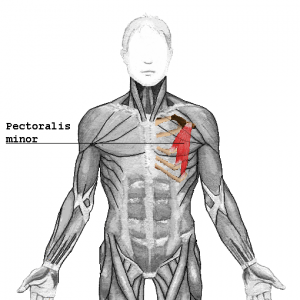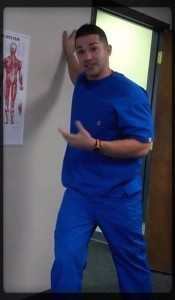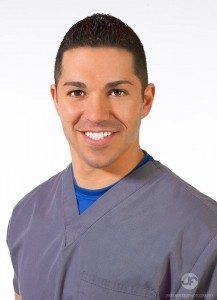This post may contain affiliate links to products or services which, if you purchase, may result in my earning commissions at no additional cost to you.
Written by Dr. Beau B Hightower
MS, DC, CSCS, CES
Shoulder pain is an unfortunate yet common reason why fighters miss out on paydays in the world of MMA and boxing. Pain on the anterior shoulder is often diagnosed as bicepital tenditinis (inflammation of the biceps attachment point), labral tears, or partial thickness rotator cuff tears. The rotator cuff is a group of four muscles that is tasked with holding the humerus or arm bone against the shoulder girdle. These diagnoses lead to time away from the ring and sometimes surgical procedures such as cortisone injections and arthroscopic surgery.
A common and under-diagnosed cause of shoulder pain is a condition known as “bench presser’s shoulder” or pectoralis minor insertional tendinopathy. You are all familiar with the pectoralis major, the chest muscle made famous by action figures and bodybuilders, and the prime target of exercises such as bench press and push-ups. A less commonly known muscle is the pectoralis minor which lies underneath the more prominent pectoralis major.
Let’s review some basic anatomy.
As you can see by the above picture, the pectoralis minor connects at the front side of the shoulder on the carocoid processof the scapula. It also connects on the lower ribs on the chest. It’s job is to downwardly rotate the scapula or shoulder blade, and to help protract the shoulder as well. Protraction occurs during bench-press but is also necessary when a fighter is striking.
Overuse of this muscle causes it to shorten, creating inflammation and tension on it’s attachment points. This often causes the athlete to feel like he has a hard time holding his shoulder back and in a proper postural position. They also have diffuse anterior shoulder pain and sometimes unexplained chest pain. Since the muscle attaches on the ribs, they may have pain when taking deep breaths as well. This often leads to referral to cardiologists who find nothing wrong with the patient’s heart. Also, the pain in the shoulder leads to orthopedic referral, where they often perform an MRI which reveals partial thickness rotator cuff tears or labral tears which may have nothing to do with the pain in the shoulder.
James Andrews, MD, a sports medicine physician and founder of Andrews Institute for Orthopaedics & Sports Medicine in Gulf Breeze, Fla., recently released the results of a study he conducted measuring the effectives of MRI on professional athletes, according to a report from The New York Times.
Dr. Andrews performed MRI on 31 professional baseball players’ shoulders. None of the players experienced pain or other symptoms of injury, but the MRI found abnormal shoulder cartilage in 90 percent of the shoulders and abnormal rotator cuff tendons in 87 percent of the shoulders.
Also, when the pectoralis minor is causing forward and downward rotation of the scapula while in a shortened position, it closes down the tiny interval in which your most commonly damaged rotator cuff muscle moves through. This can lead to impingement or “frozen shoulder” in which the patient has pain and immobility, particularly in motions above the shoulder.
The pectoralis minor is held in a shortened position during most actions in our lives including typing, driving, and texting. Through proper stretching and self myofascial release, fighters and fight fans can keep their pectoralis minor loose, mobile, and unable to cause shoulder pain.
Below is an image of a pectoralis minor static stretch for the right arm. You will lean slightly forward from this position and hold for 20-30 seconds.
Disclaimer: This article is for educational purposes only. If you have a medical condition, it is prudent that you seek medical evaluation by a properly qualified and licensed practitioner.
Dr. Beau Hightower is a former collegiate athlete and avid fight fan. He serves as the President of Elite Ortho-Therapy and Sports Medicine LLC, the premier sports injury resolution center in New Mexico.
Elite-OSM.com





